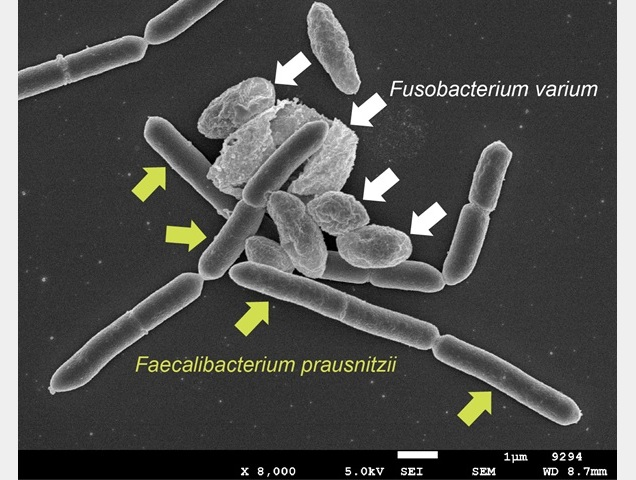Research News
Aug 1, 2025
- Veterinary Science
Helping me, inhibiting you: Analysis of interactions between intestinal microbiota
Bacteria in the digestive system may work to maintain balance directly and indirectly
Two bacteria directly interacting
Fusobacterium varium and Faecalibacterium prausnitzii exhibit cell-to-cell contact.
Credit: Osaka Metropolitan University

Intestinal bacteria are important for human health as they help digest food and regulate immune function. Thus, in recent years, it has become clear that gut microbiota dysbiosis, an imbalance in types and composition of intestinal bacteria, is associated with digestive disorders and other diseases. However, the mechanism by which bacteria interact in the intestine to maintain the microbiota balance remains unclear.
A research group led by Associate Professor Koji Hosomi at Osaka Metropolitan University’s Graduate School of Veterinary Science studied two bacteria: Fusobacterium varium (F. varium), an oral and intestinal bacterium linked to inflammation and colon cancer, and Faecalibacterium prausnitzii (F. prausnitzii), an intestinal bacterium that produces butyrate, a beneficial compound for health. The research team used stool samples from 236 participants. The team then analyzed the interactions between these bacteria using next generation sequencing (NGS) and mass spectrometry.
The results revealed that F. prausnitzii inhibits the growth of F. varium. This effect is due to the increased acidity and amount of β-hydroxybutyric acid caused by F. prausnitzii. In contrast, F. varium promotes the growth of F. prausnitzii. This interaction is likely to occur through direct contact between these bacteria.
“Going forward, further clarification of the relationships between these bacteria could provide new insights into medical and health methods for improving the intestinal environment and find new methods for preventing or improving intestinal disorders and diseases. Further understanding these bacteria could pioneer the development of foods and supplements that enhance the power of bacteria to support gut health,” stated Professor Hosomi.
The study was published in Microbiome.
Funding
This work was supported by the Ministry of Education, Culture, Sports, Science and Technology of Japan (MEXT)/Japan Society for the Promotion of Science KAKENHI (grant numbers 22K15004 and 22KK0257 to K. H.)
The Japan Agency for Medical Research and Development (AMED, grant numbers 24ae0121035s0104, 24ae0121039s0104, and 24ae0121042h0004 to J. K.)
Programs for Bridging the gap between R&D and the iDeal society (society 5.0) generating Economic and Social Value (BRiDGE) to J. K.
G-7 Scholarship Foundation to K. H.
The Hakubaku Co., Ltd. (Yamanashi, Japan)
Paper information
Journal: Microbiome
Title: Metabolite-mediated interactions and direct contact between Fusobacterium varium and Faecalibacterium prausnitzii
DOI: 10.1186/s40168-025-02168-w
Authors: Koji Hosomi, Satoko Maruyama, Tsubasa Matsuoka, Mari Furuta, Yoko Tojima, Keita Uchiyama, Makiko Morita, Hitoshi Kawashima, Toshiki Kobayashi, Jun Kunisawa
Published: 28 July 2025
URL: https://doi.org/10.1186/s40168-025-02168-w
Contact
Koji Hosomi
Graduate School of Veterinary Science
Email: hosomi[at]omu.ac.jp
*Please change [at] to @.
SDGs
